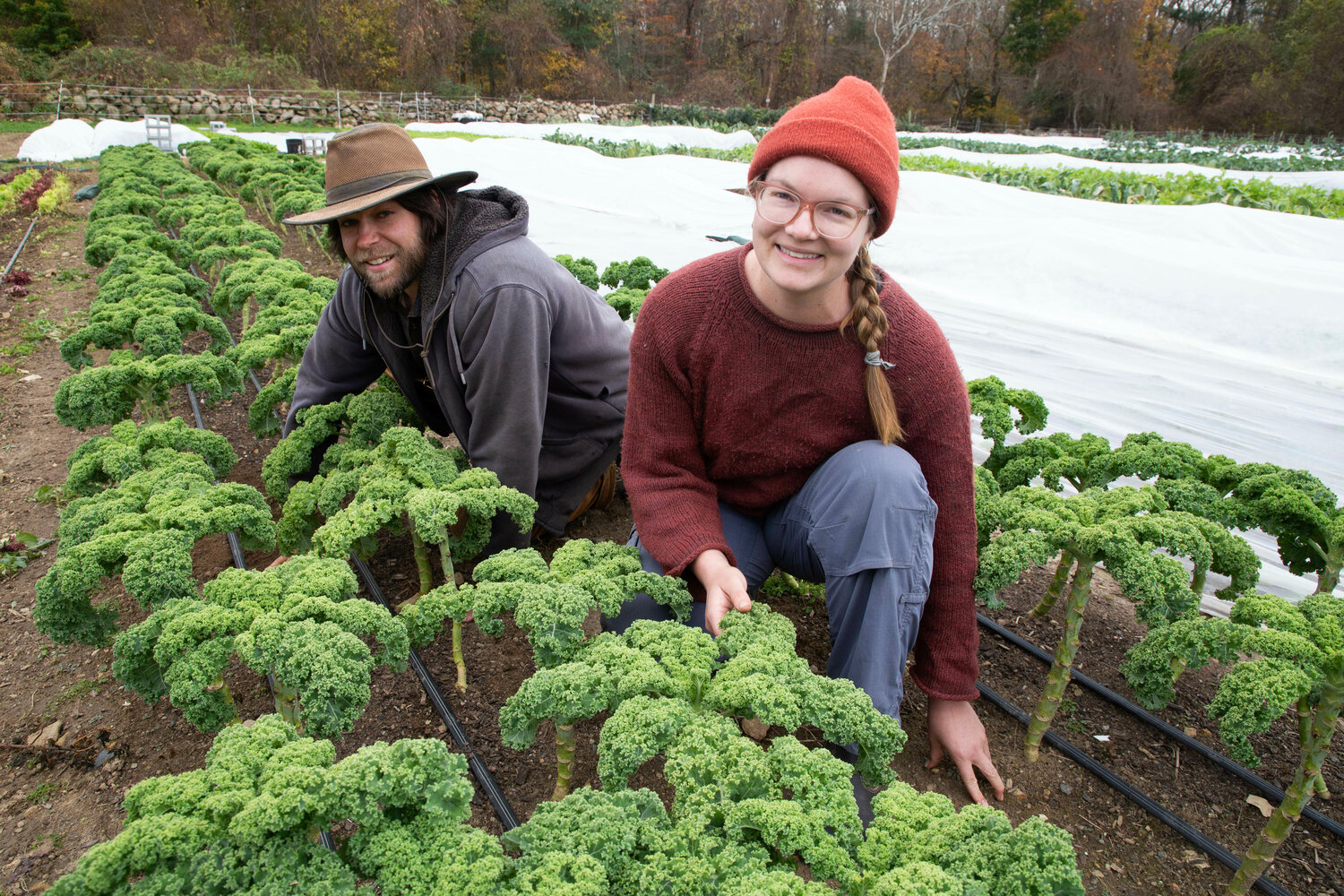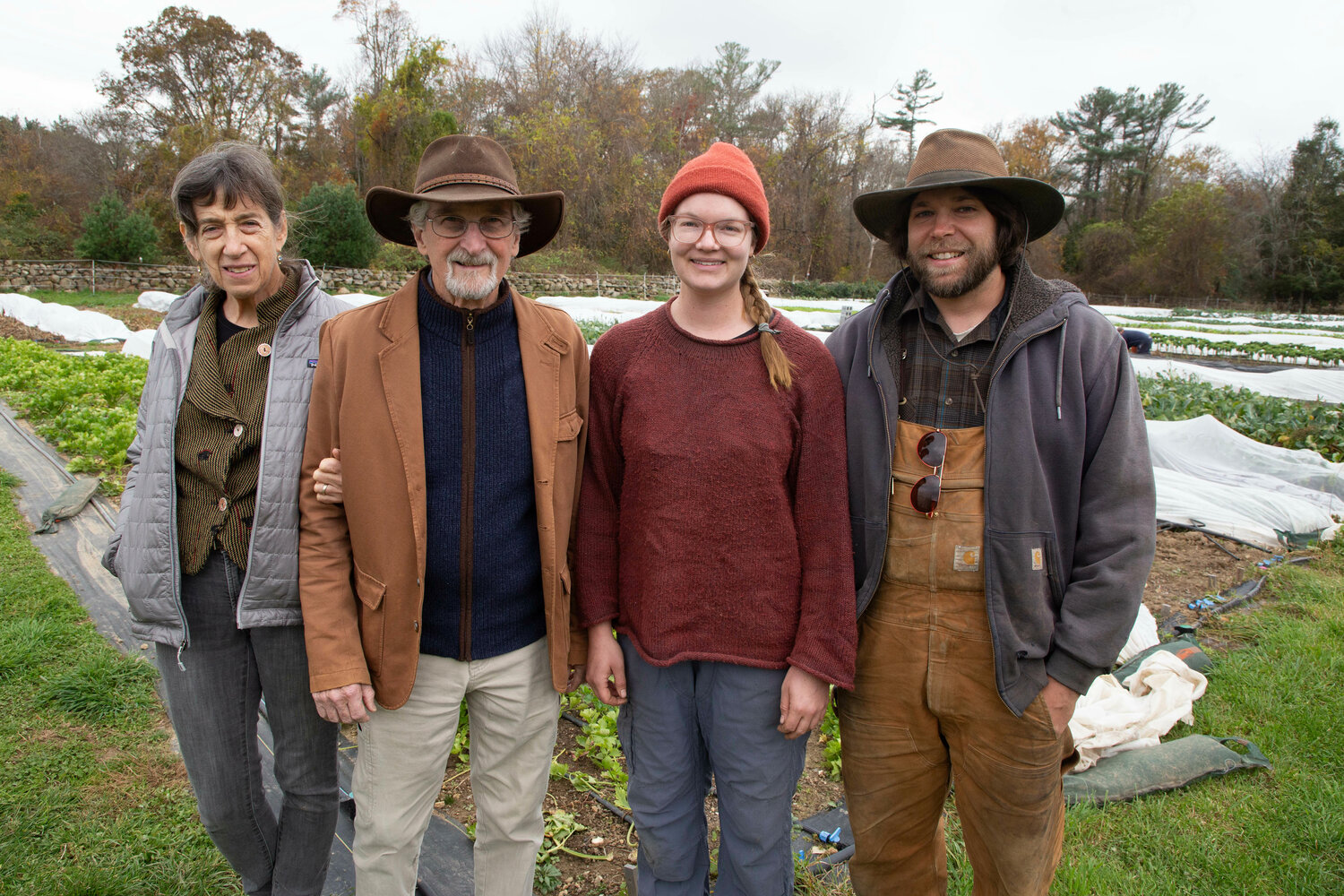Land out of reach, but Westport farming couple improvises
Farm owners lease land from couple, live and tend to crops there
In this installment of our ‘Keep the Farm in Farm Coast” series, we meet Kate Getz and Andrew Ashbrook of Aeonian Farm, located off of Sandford Road at Deborah Judd and Hank …
This item is available in full to subscribers.
Please log in to continue |
Register to post eventsIf you'd like to post an event to our calendar, you can create a free account by clicking here. Note that free accounts do not have access to our subscriber-only content. |
Day pass subscribers
Are you a day pass subscriber who needs to log in? Click here to continue.
Land out of reach, but Westport farming couple improvises
Farm owners lease land from couple, live and tend to crops there
In this installment of our ‘Keep the Farm in Farm Coast” series, we meet Kate Getz and Andrew Ashbrook of Aeonian Farm, located off of Sandford Road at Deborah Judd and Hank Keating’s property. The unique arrangement they have addresses several of the challenges facing farmers today, including affordable housing, access to capital for start-up, and secure and affordable land tenure.
Kate and Andrew met about six years ago while farming in Connecticut. It was a typical mid-size farm, about 15 acres in production, partially mechanized, with a substantial crew and all the management that comes with having lots of people to manage and produce to sell. They both had some farming experience before this, and it was here that they began to solidify their ideas about how they wanted to farm.
Andrew: At that scale, it seemed like such a challenge to stay on top of things, and financing that level of equipment presented its own challenge.
Kate: We could see that there was a certain amount of loss on a farm that big, and felt attracted to the idea of leaning up production to increase profit and reduce waste.
Andrew: After that we went up to Maine for a season and worked with Eliot Coleman. That’s where we learned intensive production methods. We learned how to use all the human scale tools like the broadfork and the bed tilther, that we use here on our farm. We saw that Eliot had this amazing customer base at markets, and we were attracted to that model of being closer to the customer, and also closer to the soil.
Kate: We learned year-round crop production and saw that season extension took the edge off the intensity of main season growing. We really care about the quality of the produce we grow.
Andrew: Don’t get me wrong, you have to feed the world, that’s what farmers do, but I think there’s a real craft to growing artisanal produce, and that’s the direction we took with our farming operation.
Tell me more about your current operation. How much land are you growing on? Do you hire help?
Andrew: We have one acre under cultivation, though it looks like more on a map. We sell at the Hingham and Braintree farmers markets, the Hingham Winter market.
Kate: And we do some wholesale to Lee’s Market, which has been really nice. We grow about 40 crops overall. The first two years we did not hire help, it was just the two of us; the past two years we have hired workers. We’ve looked for full time but housing seems to be an issue for securing full time employees in this area, so we’ve pieced it together with a mosaic of part time workers. We’re figuring out a fair pay rate, wanting to pay workers with experience a little more than those who have no experience, but we are starting out at $15 an hour this year.
Andrew: Another factor in finding full time workers is that people who are getting into farming don’t feel like it will take them anywhere. They believe that they will never be able to purchase land or own their own farm, or really earn a livable wage, so they’re not interested in pursuing farming as a career. I think that if they really want to make farming their career that they just need to start and stick with it, and not worry about that too much at the beginning because it may be a long road but they’ll get there if they can commit themselves fully to farming.
You two have housing on the farm, correct? Can you explain how the lease situation works over there at Aeonian Farm?
Kate: We have a one-bedroom apartment on the farm, and share some common spaces with Deb and Hank. They are our landowners, but they are also our neighbors; for example we hang our clothes to dry in the same space.
What kind of infrastructure is there on the farm for you to use?
Andrew: There is a propagation greenhouse, high tunnel, and cat tunnel.
Is the propagation house heated?
Kate: No, we use heat mats in there to get things going. We’ve built 2 90-foot Gothic Pro Tunnels, and one 70-foot tunnel.
Andrew: There’s also a solar powered drip-irrigation system, a barn for storage, root cellar, walk in cooler space (Coolbot), wash station area, and we have access to a tractor and implements, though we don’t really use the implements. But we do use the tractor a lot to move stuff, especially compost.
And how does the relationship work with Deb and Hank?
Kate: We have a great relationship with them. We started here during COVID, and partially because of that we spent a fair amount of time getting to know each other over shared dinners that year. Deb has a garden area where she does her own growing, as well as an orchard and berries all over the property.
Andrew: We grow a lot of food for them too, especially in winter, but Deb can grow whatever she likes in her area and they can supplement with our produce. We jump in on bigger projects if they need a hand with something. We watch their dog and chickens if they go away, and vice versa, they’ll water the greenhouse for us if we are unable to do it here and there.
Do you have any structured communication spaces, like a share board or weekly meetings?
Andrew: It’s pretty informal, we just have dinner with them and talk about things as they come up. They let us know if there’s anything they want to do or change, either in person or maybe they send a text.
Kate: We usually have an end of year meeting to touch base about the season and to talk about the next. I think that because Deb worked on farms before she understood what they were getting into by starting this thing here. I remember she said to us, “We know that farming isn’t always pretty!” We do our best to keep it neat and not let things get too out of control, but there are things like the compost pile that you just can’t do anything about! And it’s nice because she gets that.
Can you talk about how this situation has allowed you to develop your farm business and how it’s fostered your growth as farmers?
Kate: Starting our farm here has allowed us to get things going right away and really take off running. We came into in knowing what we wanted to do; we had the vision of how we wanted to farm.
Andrew: One of the most important things is housing. We both live here on the farm, and all we do is supply the vegetables for Deb and Hank, and it’s just an incredible arrangement. And also the capital investment we have been able to forgo. We didn’t have a lot of capital coming into it, so we have been able to focus on purchasing other equipment like the Paperpot Transplanter, a delivery van, and produce bins, for example.
Kate: When you’re leasing land, you don’t want to invest in a lot of permanent infrastructure.
Andrew: Everything that we’ve bought, we take with us, and that’s actually part of what Deb and Hank have asked of us, for example with the additional high tunnels, that we take them down if we were to leave. One thing that will remain here on the property is the soil fertility. We work hard to take good care of the soil here, adding compost and improving organic matter.
Kate: That was a major takeaway from working with Eliot. He’s been building his soils up there for decades, and if you did down deep enough you can see how sandy it is beneath all his beds. They created those gorgeous beds by adding compost year after year. We definitely grow healthier crops in soils that are well composted and cared for.
It sounds like you’ve made some serious strides in building up your farm here on this property. What’s coming down the pipeline for Aeonian Farm?
Andrew: Our long-term interest is in finding a farm of our own one day, but for a lot of reasons we don’t feel like that will happen anytime soon. In the meantime, we feel that we can continue to grow the business on this property by leaning into season extension and winter growing.
Kate: We’ve maxed out our growing space so we’re focusing on increasing production by cutting out sprawl, for example reducing crops like winter squash, and building out the markets we have. We can increase our profitability by honing in on these details in our production plan.
Andrew: We feel really happy with the situation we have here; it’s kind of a dream scenario.
Kate: It really is an incubator farm.
Andrew: Deb and Hank have essentially welcomed these strangers into their lives and allowed them (us) to live on their property and use their equipment, a lot of which is really nice expensive equipment…there’s a lot that could go wrong! There’s an incredible amount of trust between us.










